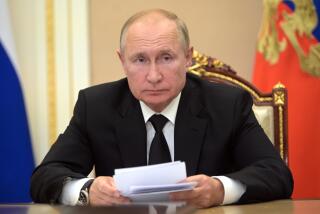Firm’s Move From Russia to Irvine Causes Concerns : Trade: Journalist cites fears that other bright entrepreneurs may relocate in the West, diverting investments.
IRVINE — As the Russian founders of Ort International Inc. basked in their new Irvine headquarters Thursday, a journalist from the daily Izvestia in Moscow worried about the impact of the company’s move to the United States.
Vladimir D. Nadeine, deputy editor of Izvestia’s foreign desk, suggested that Russia could lose to the West many more of its young, bright entrepreneurs--along with needed investments.
Nadeine was also concerned that Russia and the other members of the financially struggling Commonwealth of Independent States could lose what little tax they can collect from the growing number of private enterprises that first sprang up six years ago under perestroika.
Luckily for the commonwealth, he said, private companies in the former Soviet Union aren’t growing as fast as Ort International did and have less money to invest in operations abroad. And, Nadeine said, “many Russians in the trading business are not as sophisticated and imaginative to operate and survive in the West.”
The flight of capital from the commonwealth doesn’t concern member nations much because rubles can’t be easily converted to Western currencies, he said.
Other members of the Russian and the French press corps who flew in this week for Ort International’s grand opening said the company is doing what other private enterprises have done in the past year: move their profits and investments to the West for safekeeping.
The only difference is that most companies have done it on a smaller scale and have kept their headquarters in the commonwealth, said Sergei Lomakin, a correspondent for Russian Central Television Network.
Ort International is the holding company for several trade, investment and financial subsidiaries that Mikhail A. Gura, 37, and Eugene G. Kalakoutski, 30, founded in the last five years.
The units include Moscow-based Ortex Trading and Finance Corp., the primary subsidiary that oversees the parent company’s Russian operations, and Irvine-based Ortam Inc., which oversees trading operations in the United States. Ortam is also helping its parent company introduce the first ruble-based international credit card--the Ortcard--later this year.
Gura, Ort International’s president, and Kalakoutski, its senior vice president, tried to assuage the fears of the foreign journalists. They said they plan to pay taxes in both countries and have asked the accounting firm of KPMG Peat Marwick to conduct an audit of their holdings in California and Europe, which they estimate to be in the range of $200 million.
Overall, their trading activities in 1991 brought in more than $10 million in revenue, Gura said during a press conference Thursday. He projected this year’s revenue at about $75 million as a result of more liberal commonwealth trade regulations and increased demand for Western goods in the commonwealth and Eastern Europe.
“We’ve been growing more than tenfold each year during our first four years of operation, and I expect our growth will reach a plateau in five years as more (Russian companies) get into our kind of business,” Gura said.
For that reason, he said, Ort International is branching into the credit card business by introducing Russia’s first ruble-based credit card later this year. Gura believes that Russia’s credit market remains untapped. He said only Visa and MasterCard have teamed up with Russian banks to offer credit cards to a handful of individuals who meet stiff credit requirements.
According to a recent poll conducted by Moscow-based Central Marketing Research Institution--Russia’s equivalent to the Gallup Organization--more than 93% of about 500 commonwealth residents polled said they don’t own a credit card, and 87% said they would like to have a ruble-based card.
More to Read
Inside the business of entertainment
The Wide Shot brings you news, analysis and insights on everything from streaming wars to production — and what it all means for the future.
You may occasionally receive promotional content from the Los Angeles Times.










